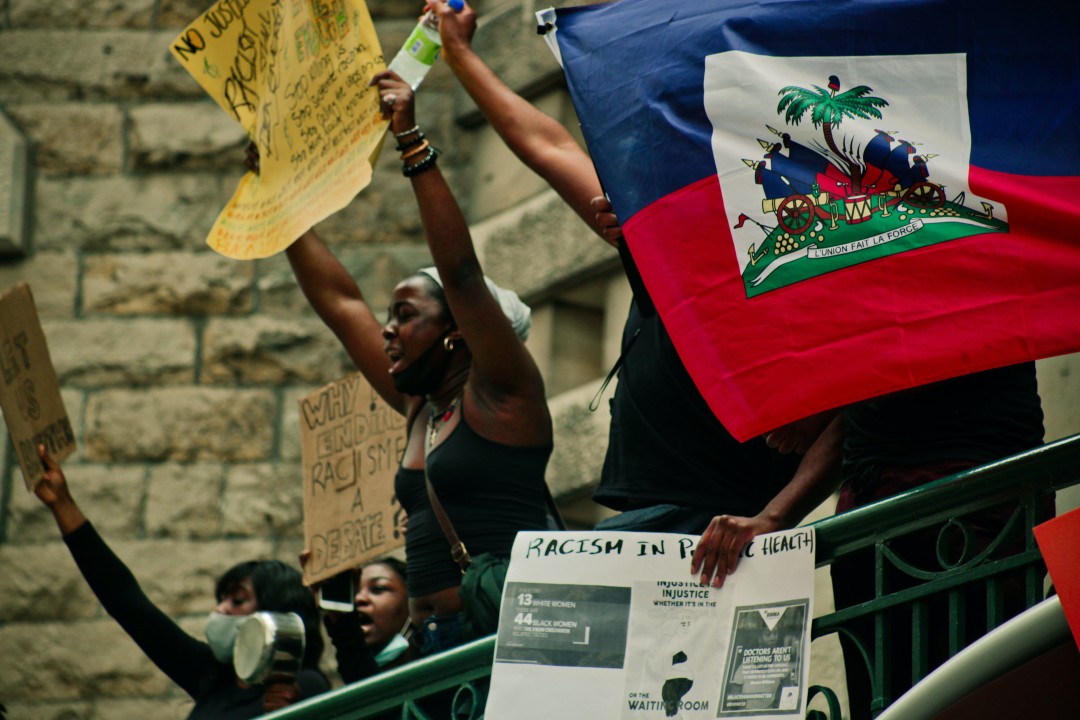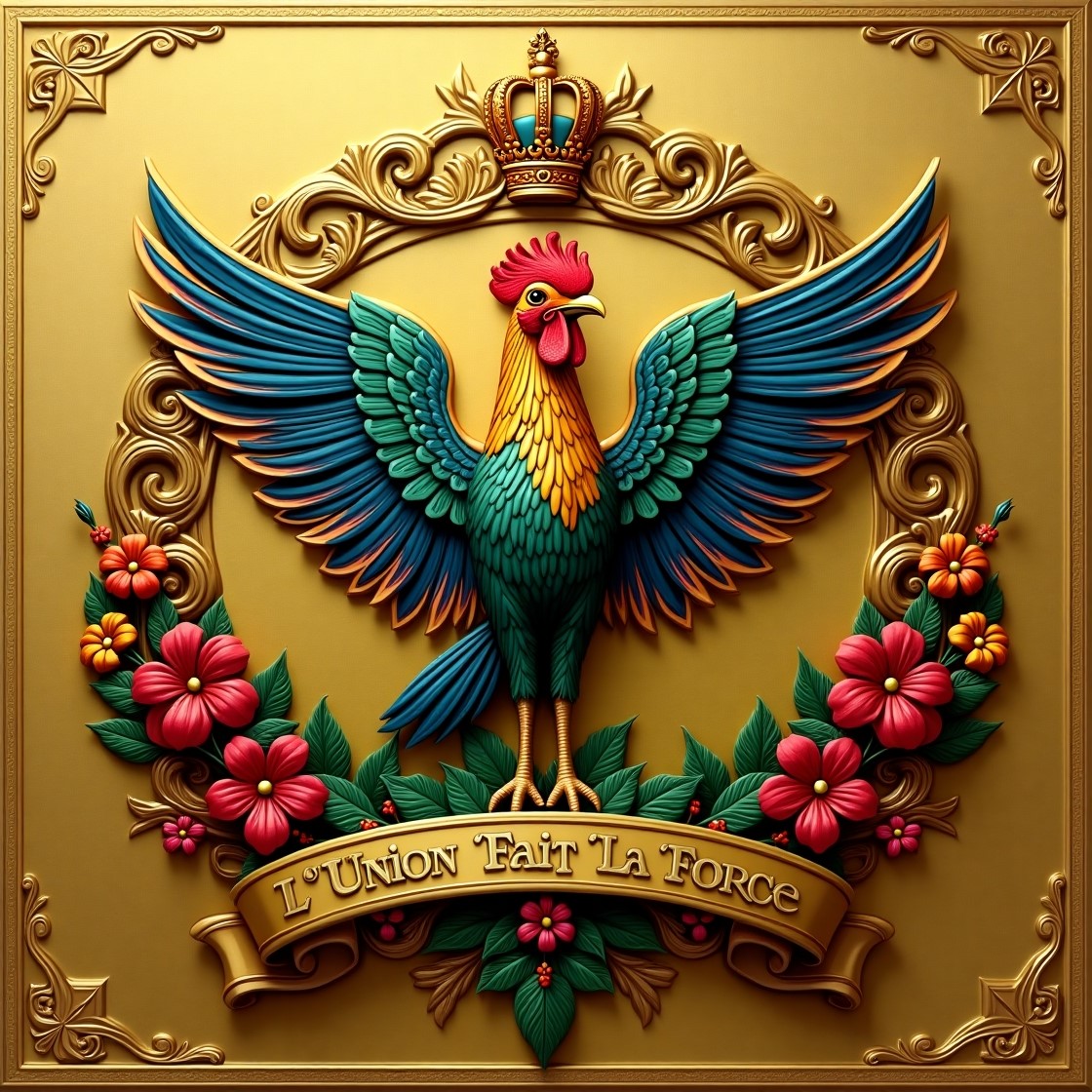The Case for a Democratic Monarchy in Hayti - Reimagining Spirituality, Security and Stability
By: Raphael Biassou (nee Rockfeler) Herisse, PhD (*with AI assist)
October 24, 2024

Hayti has faced relentless challenges recently, from political instability by the opposition, culminating in the assassination of their democratically-elected President (Jovenel Moise) economic hardship, natural disasters, gang violence, and deep-rooted social issues (i.e., colorism, classism, clannism, etc.). Despite its rich history as the first Black republic and a symbol of resilience, Hayti has struggled to find lasting stability and peace. Amid this landscape, emerging is a vision for establishing a democratic monarchy to replace the federalist system that includes many layers of dysfunctional institutions. Inspired by Toussaint Louverture’s proclamation before his arrest, the “Hayti Monachi” movement presents a bold proposal: reinstate a modern, democratic monarchy buttressed by the spiritual and divine sources, to foster national unity, honor Hayti’s cultural heritage, and promote sustainable governance. While this concept might seem unconventional, revisionist, or fanciful, successful examples of democratic monarchies worldwide provide a compelling case for this path. By combining the symbolism of a monarchy with democratic values, Hayti could establish a system that respects its heritage while addressing its contemporary challenges for the 21 st century and beyond.
Historical Context for a Monarchy in Hayti
Hayti’s journey to independence in 1804 was momentous; it marked the end of colonial rule and established Hayti as the first independent Black-led republic. The leaders of this revolution, Toussaint Louverture, Georges Biassou, Suzanne Simpone Baptiste Louverture, Jean-Jacques Dessalines, Cecile Fatiman, Marie-Jeanne Lamartiniere, Catherine Flon, and Sanity Belair symbolized hope and resilience against oppression. The monarchy of Henri Christophe, who crowned himself King of Hayti in 1811, represented an effort to establish a Haytian state defined by dignity, sovereignty, and order. Though Christophe’s reign was ultimately short-lived, it left behind a legacy of a structured, visionary, and culturally rooted monarchy. A modern monarchy could draw from this legacy, reimagined in a democratic framework that aligns with the Haytian people’s aspirations for the future.
Lessons from Modern Democratic Monarchies
Democratic monarchies, often called constitutional or parliamentary monarchies, have proven successful in maintaining stability, fostering unity, and promoting national pride in various parts of the world. Another benefit is the reduced cost of maintaining a multiparty system through annual and presidential elections. Nations such as the United Kingdom, Sweden, Japan, and Morocco illustrate how a constitutional monarchy can coexist with a democratic political system, preserving traditions while ensuring citizens have a voice in governance. These partial high-level descriptions of the systems offer key insights into how a democratic monarchy could work in Hayti.
The United Kingdom and Japan: Stability and Continuity
Both the United Kingdom and Japan exemplify democratic monarchies that combine the enduring symbol of a royal family with democratic governance structures. In these countries, the monarch serves as a symbolic head of state, representing unity and continuity while the elected government handles policy-making and administration. The monarch embodies national identity, serving as a unifying figure beyond political parties, thus reducing factionalism and political polarization. For Hayti, adopting this model would mean appointing a Haytian monarch who could represent the country’s shared history, heritage, and identity without direct involvement in day-to-day politics. A symbolic monarchy could foster stability by providing a permanent figurehead, reducing the potential for political rivalries to turn violent, as has often been the case in recent Haytian history. As a student of Haytian history, Herisse’s vision for a democratic monarchy is similar, envisioning a leader who stands above political disputes and focuses on cultural preservation and national pride.
Morocco: Cultural Continuity and Religious Leadership
Morocco’s monarchy, though more directly involved in governance, serves as a custodian of national unity, tradition, and religious heritage. King Mohammed VI has successfully blended tradition with progressive reforms, creating a model where the monarchy is both a stabilizing force and an advocate for modernization. Morocco’s monarchy is seen as a guardian of Islamic values and Moroccan identity, providing citizens with a sense of continuity and cultural identity. Hayti’s proposed democratic monarchy could similarly act as a guardian of Haytian cultural heritage, taking an active role in promoting national values and fostering unity. As a movement leader, Herisse’s vision for “Hayti Monachi” is rooted in cultural pride, seeking to reinvigorate Haytian society by embracing its royal past and creating a system where leadership symbolizes resilience and collective identity. This approach could help Hayti overcome divisions and promote a sense of pride and ownership among its people.
Scandinavia: A Balanced Role of the Monarch in Society
In Sweden and Denmark, the monarchy plays a largely symbolic role while the government remains fully democratic. The royal family’s presence reinforces cultural pride and unity, serving as a common thread that binds citizens regardless of their political affiliations. The Scandinavian monarchies focus on social welfare, education, and diplomacy, remaining involved in promoting national interests while staying out of political conflict. Hayti could benefit from a similar structure, where a royal family is seen as a source of inspiration, promoting educational programs, social development, and humanitarian causes. The Hayti Monachi proposal envisions the monarchy as a vehicle for national revitalization, with a monarch who champions causes such as poverty alleviation, education, environmental sustainability, and cultural preservation. This set of personalities would create an environment in which the monarchy serves the people, advocating for social progress and national well-being without wielding legislative power.
Advantages of a Democratic Monarchy for Hayti
1. A Symbol of National Unity and Identity
Hayti’s tumultuous political landscape has often led to fractured leadership, with rival factions undermining efforts for unity. A symbolic monarchy would offer a consistent, stable representation of Haytian identity, rooted in the shared heritage of independence and resilience. The monarch would stand as a unifying figure, representing the Haytian people’s collective aspirations rather than political agendas. Such a figure could foster unity across social and political divides, bringing Haytians together around shared cultural pride and common goals.
2. Reduction in Political Rivalries and Instability
One of Hayti’s greatest challenges has been political instability, with frequent changes in leadership often accompanied by unrest. A democratic monarchy can help mitigate this by providing a figure who is above the political fray. By focusing on long-term goals rather than short-term political gains, the monarchy would encourage stability and continuity, helping to create an environment in which democratic processes can thrive. The presence of a monarch would allow political leaders to work toward progress without resorting to divisive tactics that destabilize the nation.
3. Revival of Haytian Culture and Historical Legacy
Reinstating a monarchy would allow Hayti to reconnect with its historical roots, reclaiming the pride and resilience that characterized the early post-independence era. As the Hayti Monachi core group has emphasized, a democratic monarchy could promote Haytian culture, arts, and heritage, encouraging citizens to take pride in their nation’s unique history. This cultural emphasis would not only strengthen national identity but also attract global recognition, enhancing Hayti’s reputation and fostering tourism, which could serve as an important economic resource.
4. Focus on Social Development and Nonpartisan Advocacy
A democratic monarchy could position itself as a strong advocate for Hayti’s social development, focusing on issues such as poverty reduction, education, healthcare, and environmental sustainability. By championing these causes in a nonpartisan way, the monarchy would provide consistent support for initiatives that enhance quality of life and economic opportunity. A non-political royal figure would be able to work closely with civil society, NGOs, and international partners, fostering progress in areas essential to Hayti’s future without the influence of party politics.
The Path Forward: Hayti Monachi and Exploring a Louverturian Vision
Dr. Raphael Biassou (nee Rockfeler) Herisse has embraced the role of Chief Executive for the Hayti Monachi movement. Hayti’s founders were deeply spiritual and used their spiritual connections and forces to mount a resistance that ultimately prevailed against the world’s strongest military force at the time. Jean-Jacques Dessalines who became Emperor Jacques I negotiated with and coalesced representatives from 21 African nations and others from Europe (most notably Poland, Greece, and Britain) into a functional revolutionary armed forces to defeat the French. They established a governance system that mirrored the sovereign kingdoms of Europe. The Hayti Monachi movement represents a new approach to governance in Hayti, drawing on successful examples from around the world while adapting to Hayti’s unique context. His proposal is not to reinstate an authoritarian monarchy, but rather to introduce a democratic monarchy that is rooted in Haytian spirituality, symbolizes unity, and prioritizes stability, and progress. With careful planning, community engagement, and a clear vision, this movement could build momentum, bringing Haytians together to support a system that honors their history and heritage.
By establishing a democratic monarchy, Hayti would gain a stabilizing force that transcends political strife, encouraging unity and pride while respecting democratic principles. Drawing inspiration from successful models worldwide, Hayti Monachi offers a chance for Hayti to chart a new course—one that acknowledges and atones for its past, embraces its cultural strengths rooted in spirituality, and works toward a future of prosperity and harmony. In this vision, Hayti’s monarch would not rule but serve as a beacon of hope and resilience, a figure that all Haytians could rally behind in their pursuit of a brighter tomorrow.
Copyright and License Information
We or our licensors own and control all of the copyright and other intellectual property rights in the website and the data, information, and other resources displayed by or accessible within the website.
4.1 Creative Commons
The content on this website is available under a Creative commons – Noncommercial License, unless specified otherwise.
- For more information, please visit our Terms and Service page.
